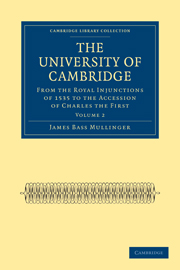Book contents
- Frontmatter
- PREFACE
- Contents
- ABBREVIATIONS, ETC.
- INTRODUCTION
- CHAP. I COMMENCEMENT OF THE UNIVERSITY ERA
- CHAP. II RISE OF THE ENGLISH UNIVERSITIES
- CHAP. III CAMBRIDGE PRIOR TO THE CLASSICAL ERA
- Part I Early College Foundations
- Part II The Fifteenth Century
- CHAP. IV STUDENT LIFE IN THE MIDDLE AGES
- CHAP. V CAMBRIDGE AT THE REVIVAL OF CLASSICAL LEARNING
- CHAP. VI CAMBRIDGE AT THE REFORMATION
- APPENDIX
- INDEX
Part I - Early College Foundations
Published online by Cambridge University Press: 07 September 2010
- Frontmatter
- PREFACE
- Contents
- ABBREVIATIONS, ETC.
- INTRODUCTION
- CHAP. I COMMENCEMENT OF THE UNIVERSITY ERA
- CHAP. II RISE OF THE ENGLISH UNIVERSITIES
- CHAP. III CAMBRIDGE PRIOR TO THE CLASSICAL ERA
- Part I Early College Foundations
- Part II The Fifteenth Century
- CHAP. IV STUDENT LIFE IN THE MIDDLE AGES
- CHAP. V CAMBRIDGE AT THE REVIVAL OF CLASSICAL LEARNING
- CHAP. VI CAMBRIDGE AT THE REFORMATION
- APPENDIX
- INDEX
Summary
Transference of the leadership of thought from Paris to Oxford
Testimony of Richard of Bury
The names which, in the preceding chapter, have served to illustrate the varied activity of English thought would seem to justify us in asserting that, with the advance of the fourteenth century, the palm of intellectual superiority had been transferred from Paris to the English universities. Without insisting upon the philosophic insight of Bacon and the metaphysical ability of Duns Scotus, we may fairly ask whether any other university can point, at this period, to men comparable in their respective excellences and extended influence with William of Occam, Bradwardine, and Richard of Bury. If Paris can claim to have given to Oxford and Cambridge their statutes and their organisation, Oxford can boast that she gave to Paris some of her ablest and most influential teachers. As the renown of those eminent thinkers became established, men did not fail to note the comparative sterility of the continental university. Petrarch exultingly pointed to the fact that her greatest names were those of men whom he claimed as compatriots. Richard of Bury, while he dwells with enthusiasm on the literary wealth and established prestige of the French capital, does not hesitate to imply that her preeminence is already a thing of the past, and attributes to his own country the merit of according a far more ready reception to novel truth; Paris, he declares, in her regard for antiquity, seems careless of adding to her knowledge, while the perspicacity of English thought is ever adding to the ancient stores.
- Type
- Chapter
- Information
- The University of Cambridge , pp. 213 - 257Publisher: Cambridge University PressPrint publication year: 2009First published in: 1884

